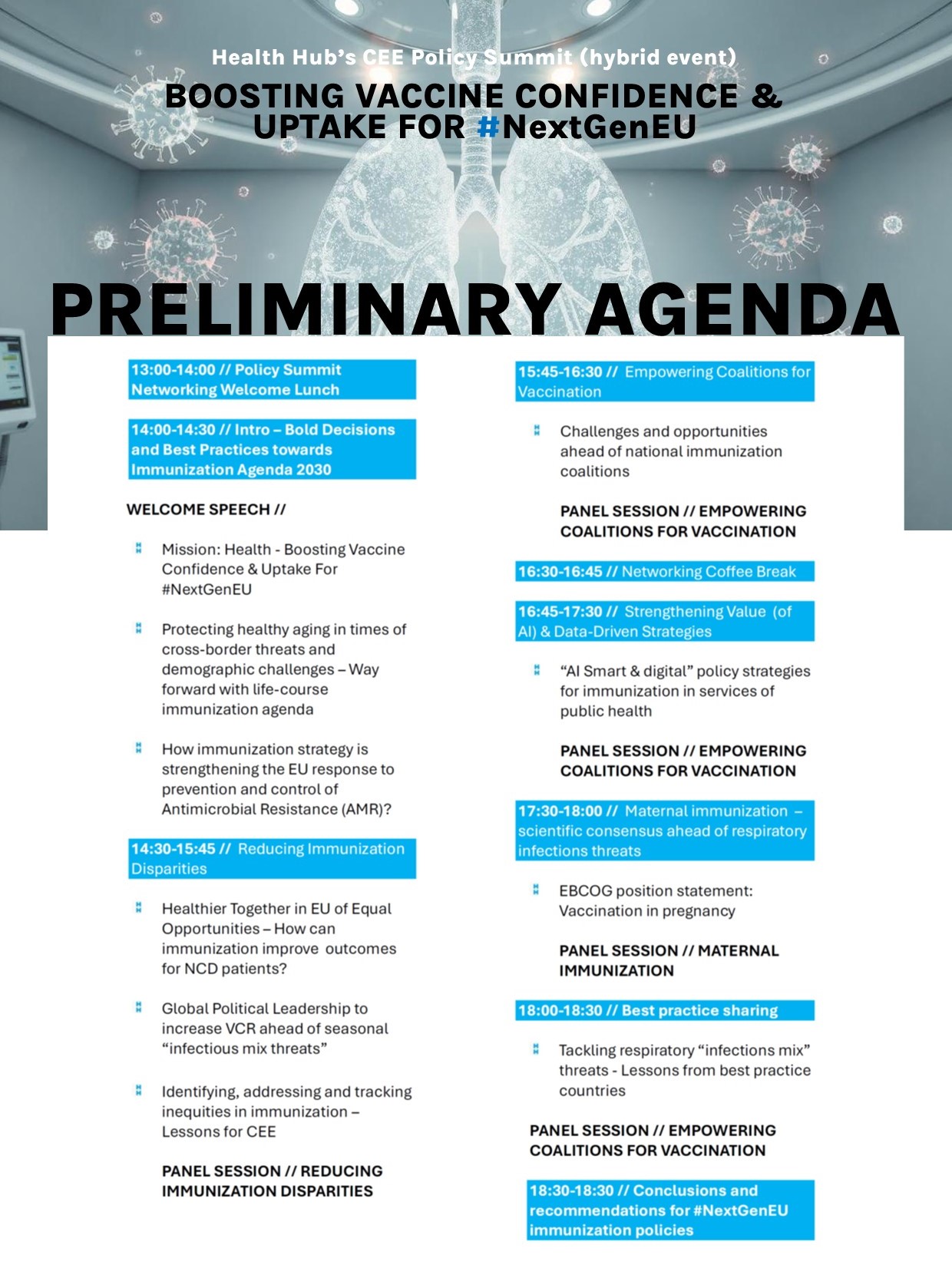Health Policies for Boosting Vaccine Confidence and Uptake in the European Union: A Focus on Central and Eastern Europe (CEE)
espiratory infections (influenza, RSV, pneumococcal disease, pertussis, COVID-19 etc.) season is always timing to raise awareness on importance of prevention and timely protection, specially of high risk patients, to reduce complications and burden of disease from clinical, human and economical point of view. On the occasion of Health Hub’s CEE Policy Summit “BOOSTING VACCINE CONFIDENCE & UPTAKE FOR #NextGenEU”, supporting UN’s Pact for the Future, we are giving a reflection on health policies for boosting vaccine confidence and uptake in the European Union, focusing on Central and Eastern Europe (CEE).
Health Policies for Boosting Vaccine Confidence and Uptake in the European Union:
A Focus on Central and Eastern Europe (CEE)
Vaccination remains one of the most effective tools in preventing infectious diseases, protecting public health, and saving lives. However, the COVID-19 pandemic underscored the significant challenges that persist in vaccine confidence and uptake, particularly in Central and Eastern European (CEE) countries. Despite the EU’s remarkable efforts to provide equitable access to vaccines, disparities in immunization rates, misinformation and raising distrust have led to uneven vaccination coverage across EU Member States.
Ahead of respiratory infection threats spread accross borders, by addressing immunization disparities, empowering national vaccination coalitions, enhancing data-driven strategies, sharing best practices, and promoting evidence – based recommendations on maternal immunization, modern policies can help reduce gaps in vaccination rates and build stronger public trust in vaccines.
-
Reducing Immunization Disparities in the EU
Immunization disparities between Western and Eastern Europe, and even within countries themselves, are a significant challenge. In CEE countries, lower vaccination rates are often linked to various factors, including economic barriers, access to healthcare, historical skepticism towards vaccines, and inconsistent public health campaigns.
To ensure that all citizens of the European Union (EU), particularly those in Central and Eastern European (CEE) countries, benefit equitably from novel immunization programs and vaccines, we must prioritize accelerating access to these life-saving interventions. Disparities in vaccination coverage, compounded by barriers to timely access in CEE, must be addressed with urgency. These challenges not only undermine public health but also exacerbate the risk of preventable disease outbreaks across the EU. Iti s crucial to close these gaps and ensure that every person, regardless of their location or socio-economic status, can access the latest immunization intervention according to the global recommendation of public health authorities.
Key Strategies:
- Targeted Awareness Campaigns: Governments should launch national campaigns that address vaccine hesitancy, specifically focusing on CEE populations where trust in vaccines is lower. These campaigns should be culturally tailored and provide clear, evidence-based information about vaccine safety and efficacy.
- Improved Access: Policies that make vaccines more accessible through community health programs, mobile vaccination units, and incentives for healthcare providers to deliver vaccines can help bridge gaps, especially in rural and underserved areas.
- Incentives for Healthcare Providers: Encourage healthcare professionals to actively promote vaccination by providing them with the necessary tools, training, and incentives. This includes expanding continuing education programs on the importance of vaccines and their role in preventing disease.
-
Empowering National Coalitions for Vaccination
To increase vaccine uptake, it is essential to create multi-sectoral, national coalitions that bring together stakeholders from various sectors, including public health officials, medical professionals, community leaders, and civil society organizations.
Key Strategies:
- Forming National Task Forces: CEE countries should establish national vaccination task forces / coalitions according to recommendations of EU authorities, that coordinate strategies across countries and region. These coalitions can help unify efforts, share resources, and ensure a consistent, high-impact approach to immunization.
- Local Leadership: Empower local leaders and community influencers to take an active role in vaccination campaigns. These leaders often have more influence over their communities and can be instrumental in combating misinformation and fostering trust in vaccines based on strong scientific evidence.
-
Strengthening Value & Data-Driven Strategies
Data is critical to understanding vaccination trends, identifying gaps, and developing targeted interventions. A robust data system can help track vaccination rates, monitor vaccine safety, and provide real-time information for adjusting policies as necessary.
Key Strategies:
- Vaccine Registries and Monitoring Systems: The establishment of national vaccine registries in all EU member states, especially in CEE countries, would improve vaccine tracking, help identify unvaccinated populations, and inform public health decisions. Data-driven monitoring systems allow authorities to respond quickly to vaccine supply shortages or spikes in vaccine-preventable diseases.
- Surveys and Research: Regular surveys and studies on vaccine confidence and barriers to vaccination should be conducted to identify specific concerns in different demographic groups, including younger populations, ethnic minorities, and those living in rural areas. The findings of these studies should inform targeted interventions and communication strategies.
- Transparent Data Sharing: Encourage the sharing of anonymized vaccine data across EU countries to identify trends and challenges in immunization uptake. This would facilitate cross-border collaboration in combating vaccine hesitancy and disparities in vaccination coverage.
- Digital Reminders: There are examples of countries that are already digitally integrated at the national level, connecting pharmacies, family medicine offices, and specialists through a central health information system. Through such a central information system, and in accordance with the prescribed immunization program, it is very easy to introduce digital reminders that would ‘pop up’ in the application for healthcare professionals during patient visits, if, based on the eligibility criteria of national immunization programme. It is also suggested to utilize the potential of electronic health records, where patients can find relevant immunization recommendations from national health authorities.
-
Sharing Best Practices Across EU Countries
One of the most valuable tools in improving vaccine confidence and uptake is the sharing of best practices among EU member states. Many countries have successfully overcome vaccine hesitancy, access issues or logistical barriers, and their experiences can be invaluable to others facing similar challenges.
Key Strategies:
- EU-Wide Knowledge Sharing Platforms: Create platforms for sharing best practices in vaccination strategies, particularly for CEE countries. These platforms can host webinars, workshops, and discussions where experts from countries with high vaccination rates share their experiences in overcoming common barriers.
- Cross-Border Initiatives: Encourage cross-border initiatives where countries with more successful vaccination programs can offer technical support and guidance to countries with lower uptake. This could involve the exchange of expertise in policy design, communication, and logistics.
- EU Funding for Vaccination Programs: The European Commission can provide funding and technical assistance to CEE countries to implement proven strategies. This support could include funding for vaccine education campaigns, digital health tools, and improved healthcare infrastructure.

-
Maternal Immunization Policies in the EU
According to European Board and College of Obstetrics and Gynaecology (EBCOG), maternal immunization can improve maternal and child health by reducing maternal and infant morbidity and mortality associated with disease caused by pathogens that are relevant to the perinatal period and early life, and for which there are currently no effective alternative preventive measures. National immunization programmes reach acceptable vaccination coverage rates (VCRs). Many EU countries, particularly in CEE, have not yet fully integrated maternal immunization policies into their public health systems. European Board and College of Obstetrics and Gynaecology (EBCOG) supports the recommendations made by International public health institutions (WHO, CDC) about the use of vaccines during pregnancy.
Key Strategies:
- National Maternal Immunization Programs: CEE countries should establish or strengthen national maternal immunization policies, according to international public health institutions and professional associations, ensuring that pregnant women are immunized by clear guidelines, which does not only protects the mother but also provides passive immunity to the newborn.
- Public Education and Guidance: Educating healthcare professionals and the public on the importance of maternal immunization is critical, taking evidence and scientific based recommendations into consideration. Pregnant women should be provided with clear, accessible information regarding the benefits and safety of vaccines during pregnancy where it is appropriate according to public health authorities and institutions.
- Integrating Immunization into Prenatal Care: Incorporate immunization as part of routine prenatal care visits when appopriate according to immunization programme of public health institutions. Healthcare providers should be trained to discuss immunization options with expectant mothers and to ensure that vaccinations are given at the appropriate times during pregnancy according to immunization programme of public health institutions.
Conclusion
Addressing the challenges of vaccine confidence and uptake in the European Union, especially in Central and Eastern Europe, requires a comprehensive and coordinated approach. By focusing on reducing immunization disparities, empowering national vaccination coalitions, utilizing data-driven strategies, sharing best practices, and strengthening maternal immunization policies, the EU can create a more resilient and vaccine-confident population.
For CEE countries, targeted interventions that address historical mistrust, misinformation, and healthcare access barriers will be crucial in achieving equitable vaccination coverage. With ongoing collaboration, modern, robust and dana-driven policies, and commitment to building public trust, the EU can pave the way for a healthier, more vaccinated future for all its citizens.
Health Hub’s CEE Policy Summit “BOOSTING VACCINE CONFIDENCE & UPTAKE FOR #NextGenEU”







